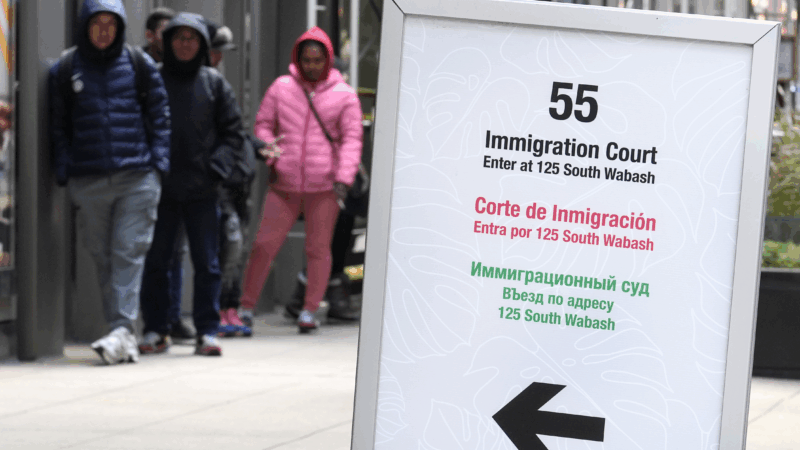Trump cuts threaten access to birth control for millions of women
Contraception is a routine part of life for many Americans and polls show people across political parties agree that it should be legal and accessible.
But the Trump administration is walking back access to birth control for some people — including withholding funding from a Nixon-era program that guarantees access to contraception for low income people.
Title X under threat
It’s only been a few generations since birth control was widely accessible in the U.S. Married women were not legally allowed to use contraception in some states, until the 1965 Supreme Court decision Griswald v. Connecticut. Shortly after that, in 1970 – facing poor health outcomes for mothers and babies – Congress created Title X.
Enacted under the Nixon administration, the program guaranteed free contraception for people who needed it. In a special message to Congress in July 1969, Nixon wrote: “It is my view that no American woman should be denied access to family planning assistance, because of her economic condition.”
The program has existed ever since. The 2025 budget provided $285.6 million in Title X funds.
Now, a group of 15 public health organizations is suing the Trump administration, arguing that the federal government jeopardized access to services including birth control for more than 800,000 people due to illegal withholding of Title X dollars.
One of the plaintiffs in the lawsuit is Bridgercare in Montana, which distributes funding to 20 reproductive health clinics across the state. Stephanie McDowell, Bridgercare’s executive director, recalls receiving a letter from the Department of Health and Human Services on March 31st, notifying her that her organization’s funding would be suspended the next day. The letter said Bridgercare had violated the Civil Rights Act and Executive Orders issued by President Trump. Other plaintiffs received similar letters.
“ They were citing statements of anti-racism — statements that might be what we would commonly understand as DEI (Diversity, Equity and Inclusion) efforts,” says McDowell.
A message on the organization’s website underscores that they welcome patients of different identities, including “teens, LGBTQ+ individuals, and survivors of sexual assault.”
McDowell says she believes these kinds of statements are what HHS is referring to.
“ We meet people where they are, and that oftentimes means letting people know that we’re a safe, welcoming space for them, regardless of their income, regardless of their identity,” says McDowell.
The Department of Health and Human Services did not respond to a request for comment on this story.
McDowell says her organization has been limping by since their funding was revoked, largely relying on donations. Though services haven’t been interrupted for patients, the organization is not in a sustainable position without federal funds, she says.
Other organizations have not been able to shield their patients from the impact of reduced funding.
In Utah, Planned Parenthood representatives said they’ve had to close two clinics as a result of Title X funds being withheld, as well as implement a fee for some contraception services that were previously free.
“People are living paycheck to paycheck in our communities,” says Shireen Ghorbani, who is the interim director of Planned Parenthood Association of Utah. “We are not able to count on the federal government to keep the promise it made to access low cost care and to plan and space their families.”
The National Family Planning and Reproductive Health Association, which is representing the organizations that brought the Title X lawsuit against the government, note that some grant recipients have received notice that their Title X funding will be restored.
Permission to limit contraception
It’s not only Title X funds that are jeopardizing access to contraception, says Kimi Chernoby, an attorney with the National Women’s Law Center. She points to cuts to Medicaid included in the Republican spending bill that was recently signed into law, which jeopardize access to healthcare — including contraception — for millions of women in coming years.
A number of state efforts have also sought to limit birth control. In Indiana, Republican lawmakers removed IUDs and condoms from a program that aimed to increase access to birth control, replacing them with “fertility awareness based methods.” After a Right to Contraception bill passed with bipartisan support in Virginia, Republican Governor Youngkin vetoed it.
Chernoby says the Trump administration has created a permission structure for these kinds of efforts. She points to Project 2025, the Heritage Foundation’s “blueprint” for the new Republican administration. President Trump has adopted many of its policies.
Project 2025 suggests changing requirements that employer-provided insurance and the Affordable Care Act cover contraception.
The Trump administration also included a provision in the most recent budget law that would withhold Medicaid funds from Planned Parenthood clinics across the country. The change could potentially cripple the organization and prevent it from providing healthcare services including contraception.
That provision is currently blocked in court, though Planned Parenthood officials say they are preparing for an appeal and underscore that 200 clinics across 24 states are at risk of closure.
“They are intent on expanding the population”
Neither the Trump administration nor the Heritage Foundation responded to a request for comment on this story or explained why they seek to reduce access to contraception.
Planned Parenthood’s Ghorbani has a theory.
“It is very clear that they are intent on expanding the population,” says Ghorbani. She points out that the Trump administration has called on Americans to have more babies, and says limits to reproductive care are a means of achieving that goal. “That can be everything from contraception to access to abortion care,” she says.
Ghorbani says even though these cuts have hit low-income patients the hardest, attacks on public health impact the whole ecosystem of healthcare.
“All of this is building a structure that makes it harder and harder for individuals to control their sexual and reproductive lives, to plan their families and have kids when they want to.”
Kimi Chernoby, with the National Women’s Law Center, draws parallels between the administration’s effort to limit contraception with successful efforts to limit abortion.
“ We are seeing the anti-abortion folks just repurpose their playbook,” says Chernoby, who notes that contraception may be more difficult to limit than abortion given its widespread popularity.
“We see them testing these restrictions on minors and low income communities, but we should regard it very much as a litmus test — and expect that they are going to expand these restrictions to affect all of us.”
Transcript:
AILSA CHANG, HOST:
Contraception is a routine part of life for many Americans, and people across political parties agree that it should be legal and accessible. But the Trump administration is walking back access to contraception for some people. NPR’s Katia Riddle reports.
KATIA RIDDLE, BYLINE: It’s been over 50 years that women in this country have had the freedom to plan pregnancies. Birth control became widely available here in the 1960s. Under the Nixon administration, Congress created a program called Title X. It guaranteed free contraception to low-income people. That’s still the funding that Stephanie McDowell relies on to run her public health program – or did, until a few months ago.
STEPHANIE MCDOWELL: We received a letter late in the afternoon on March 31 that our grant year-four funding that was to begin on April 1 – the next day – was being withheld.
RIDDLE: McDowell works at an organization called Bridgercare in Montana. They oversee 20 reproductive health clinics across the state. The Department of Health and Human Services withheld their funding because it said Bridgercare made public statements that violated the Civil Rights Act and recent executive orders from the Trump administration.
MCDOWELL: In our letter, they were citing, like, statements of antiracism, so statements that might be what we would commonly understand as, like, DEI efforts.
RIDDLE: That same thing happened at similar organizations across the country, though a few have since been notified their funding would resume. Still, as a result, more than 800,000 people either lost access to contraception or are at risk of losing it. That’s according to a group of 15 organizations that are now suing the administration. Kimi Chernoby is an attorney with the National Women’s Law Center.
KIMI CHERNOBY: So essentially, we see attacks on birth control at both the state level and the federal level.
RIDDLE: In addition to the Title X funds, she points to recent cuts to Medicaid. That’s part of the Republican spending bill, which recently became law. These cuts jeopardize access to health care, including contraception, for millions of women in coming years. There’s also recently been a number of attempts to limit access to contraception at the state level. After a right-to-contraception bill passed with bipartisan support in Virginia, the Republican governor there vetoed it. Chernoby says the Trump administration has created a permission structure for these kinds of efforts.
CHERNOBY: I think the fact that attacking birth control specifically appears in Project 2025 tells us how coordinated this is.
RIDDLE: Project 2025 is the Heritage Foundation’s blueprint for the new Republican administration. President Trump has adopted many of its policies. The administration has not given a reason as to why it’s limiting access to contraception. Neither the Department of Health and Human Services nor the Heritage Foundation responded to our request for comment on this story.
RIDDLE: Shireen Ghorbani is with Planned Parenthood of Utah. She points out that the Trump administration has called on Americans to have more babies.
SHIREEN GHORBANI: It is very clear that they are intent on expanding the population.
RIDDLE: Her organization is part of the lawsuit against the administration.
GHORBANI: And that can be everything from contraception, which I genuinely think is in the crosshairs now, to, you know, access to abortion care, which is something that, you know, Republicans have been working on for decades.
RIDDLE: Ghorbani says even though these cuts have hit low-income folks the hardest, attacks on public health impact the whole ecosystem of health care.
GHORBANI: All of this is building a structure that makes it harder and harder for individuals to control their sexual and reproductive lives, to plan their families and have kids when they want to.
RIDDLE: That’s why, she says, five decades ago, the federal government created a program that allowed everyone to access birth control. Katia Riddle, NPR News.
(SOUNDBITE OF MUSIC)
Lindsey Vonn says she suffered ‘complex tibia fracture’ in her Olympic downhill crash
The 41-year-old star said her torn ACL was not a factor in her crash. "While yesterday did not end the way I had hoped, and despite the intense physical pain it caused, I have no regrets," she wrote.
Guerilla Toss embrace the ‘weird’ on new album
On You're Weird Now, the band leans into difference with help from producer Stephen Malkmus.
Nancy Guthrie search enters its second week as a purported deadline looms
"This is very valuable to us, and we will pay," Savannah Guthrie said in a new video message, seeking to communicate with people who say they're holding her mother.
Immigration courts fast-track hearings for Somali asylum claims
Their lawyers fear the notices are merely the first step toward the removal without due process of Somali asylum applicants in the country.
Ilia Malinin’s Olympic backflip made history. But he’s not the first to do it
U.S. figure skating phenom Ilia Malinin did a backflip in his Olympic debut, and another the next day. The controversial move was banned from competition for decades until 2024.
‘Dizzy’ author recounts a decade of being marooned by chronic illness
Rachel Weaver worked for the Forest Service in Alaska where she scaled towering trees to study nature. But in 2006, she woke up and felt like she was being spun in a hurricane. Her memoir is Dizzy.





